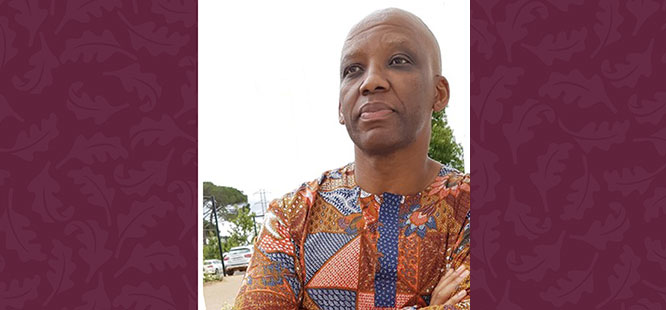The internationally and nationally acclaimed scholar, Prof Kopano Ratele, joined the Department of Psychology in the Faculty of Arts and Social Sciences at Stellenbosch University (SU) recently. He is the former Director of the South African Medical Research Council Men, Injury and Violence Research Unit and Professor at the University of South Africa, where he ran the Transdisciplinary African Psychologies Programme.
“Prof Ratele is one of the most prominent and respected academic psychologists working in South Africa today. His academic publications have been influential not only in South African psychology, but in the social sciences and humanities in general,” says Prof Lou-Marié Kruger, Chair of the SU Department of Psychology. “We are indeed privileged to have someone of his stature joining the Department at a time in which we are focusing on transforming not only the department, but the discipline. We are looking forward to his contributions, particularly to the establishment of his proposed interdisciplinary centre, the African Centre of Critical and Cultural Psychology, and a proposed new academic programme, a Masters in Critical Psychology.”
In Ratele’s research, teaching, social-political activism and community mobilisation he focuses on men and masculinity, African psychology, violence, sexuality, fatherhood and race. He has made significant contributions in these areas, both through empirical research projects (often collaborative across disciplinary boundaries) and theoretical reflection.
“These topics speak to some of the core issues facing South African society currently and also to the role and self-understanding of psychology within this society: gender-based and other forms of violence, race and racism, and the transformation of psychology in ways that will enable it to engage more meaningfully with the psychosocial realities and challenges of our time and particular context,” comments Kruger.
“Given his background and continued work, Ratele is set to make an enormous contribution as a researcher, teacher and public intellectual in the Department. Not only is he a celebrated and very productive academic psychologist who will add to the prestige and productivity of the department, but he brings with him considerable expertise and a vibrant academic network. He will deepen our research and discussions about topics such as men and masculinity and race and racism and will be a role model and inspiration for students and colleagues.”
“I left psychology over a decade ago because it was, simply stated, driving me insane, a state that resonates among many critically and creatively inclined psychologists and students of psychology,” says Ratele.
“When I considered returning to the discipline, three facts about Stellenbosch University stood out. Firstly, the ongoing efforts of the University, specifically efforts within the Department of Psychology, to critically reflect on the University itself and what disciplines are for. Secondly, if you look closely, there is a rich seam of critical and even anarchic thinking at Stellenbosch, that is, some very interesting thinkers and makers with whom I hope to create spaces of intellectual joy and socially impactful work. Thirdly, I am looking forward to being part of what I imagine will be a collective that will train some of the most exciting, original and creative generation of psychologists and psychology graduates in this decade. From what I have learnt so far, Stellenbosch is the best place to support this vision. That’s perhaps the most significant of all the facts,” he says.
Adds Prof Anthony Leysens, Dean of the Faculty of Arts and Social Sciences: “Professor Ratele will not only be an asset for the Department of Psychology, but for the faculty as a whole. He has a proven record of inter- and trans-disciplinary research and collaboration, also with colleagues in our faculty. He has the ability to deepen the relationship between the Department of Psychology and other departments in our faculty, and to foster research that incorporates both psychological and social science dimensions.”
Ratele authored numerous academic articles and chapters in edited volumes, published both locally and internationally. His edited and authored books include There Was This Goat: Investigating the Truth Commission Testimony of Notrose Nobomvu Konile (2009, co-authored with Antjie Krog and Nosisi Mpolweni), Liberating Masculinities (2016), Engaging Youth in Activism, Research and Pedagogical Praxis: Transnational and Intersectional Perspectives on Gender, Sex, and Race (2018, co-edited with Jeff Hearn, Tammy Shefer and Floretta Boonzaier) and, most recently, The World Looks Like This From Here: Thoughts on African Psychology (2019).
“With these books especially, he has positioned himself not only at the forefront of empirical research in his fields of study, but as an important theoretical voice and as one of the key figures in debates about the shaping of psychology in post-apartheid South Africa,” says Kruger. “He has also developed and maintained a high level of visibility as a public intellectual, frequently contributing to the print media, blogs and radio discussions.”
Prof Ratele served as a member of the Ministerial Committee on Transformation in South African Universities and is convener of the National Research Foundation’s Specialist Committee for Psychology Rating Panel. He is a former president of the Psychological Society of South Africa and a former chairperson of Sonke Gender Justice.

